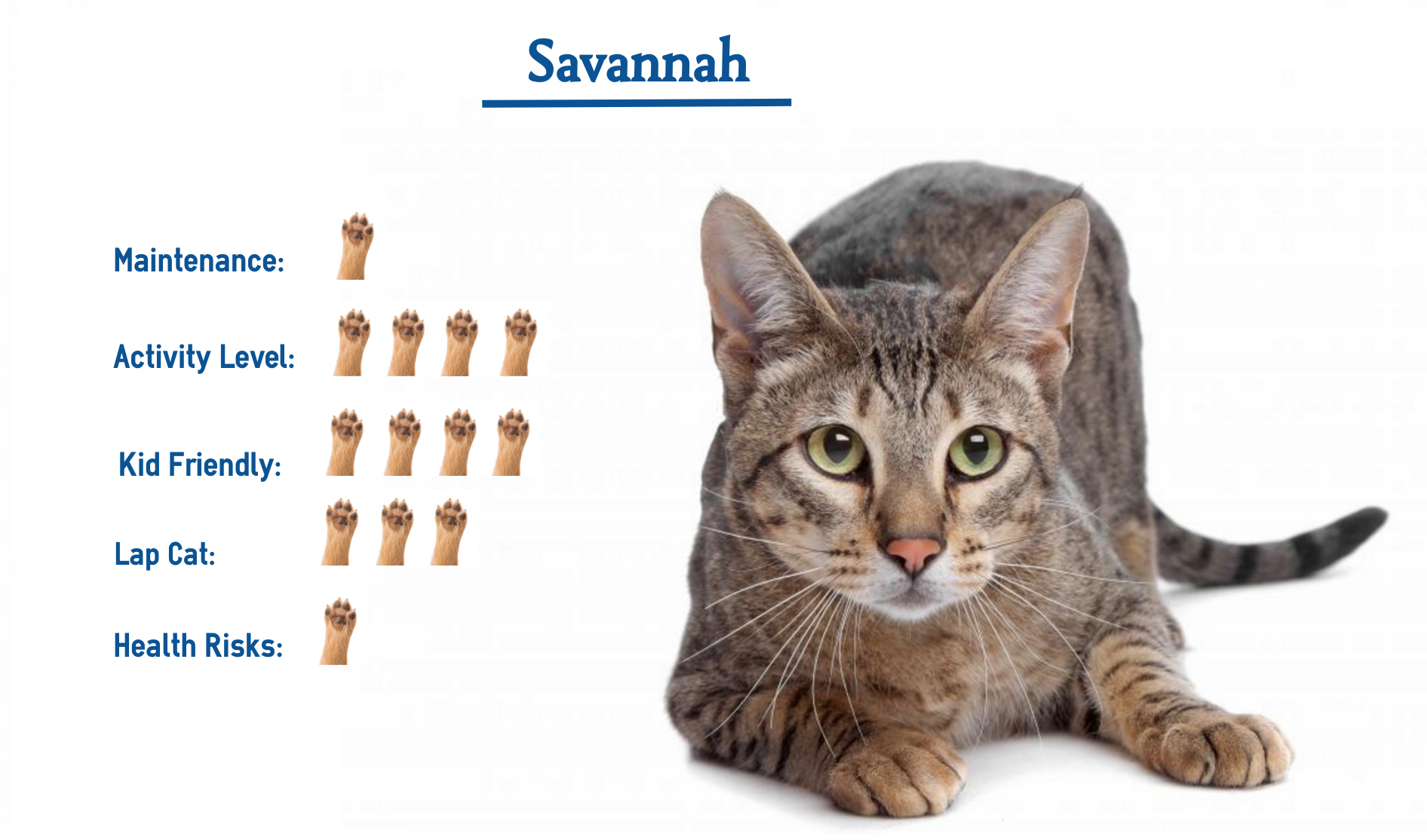OK, we’ll admit that if all cats were the same, and choosing which one was best for you was simply a matter of deciding which cat looked the “coolest,” just about every household in America would have at least one Savannah cat in it. After all, just who hasn’t at one time in their life wanted to own a miniature cheetah? But just because these cats are beautiful and look like someone took a full-grown cheetah and miniaturized it for your home, this doesn’t mean you should necessarily make one your own!
This is why…
In this article, we wanted to take a moment and discuss what it might be like to own a Savannah so that if you’re ever fortunate enough to be given the chance to own one of these unique cats, you’ll know for sure if it’s a good idea.
So, without further ado, let’s dive right in.
Savannah Cat Breed Fast Facts
Country of Origin: United States of America
Size: Large
Weight: 17 to 25 pounds
Eyes: Slightly “hooded” creating a “boomerang” appearance (green)
Shape of Head: Triangular
Lifespan: 17 to 20 years
Origin of the Savannah Cat Breed
Even though these cats have somewhat of an “ancient” look, this breed only dates back to the mid-1980s when the first documented Savannah cat was born when a female seal point was bred with a male Serval cat. The result of such a unit was quite a surprise to see. And a pleasant surprise because the kittens produced from this litter were truly magnificent.
The first-born kitten…
Savannah was appropriately named after the grasslands homeward bound for the servals family. This beautiful cat became the first-generation hybrid cross. Savannah was then “used” to breed the second generation of what would ultimately become the Savannah cat breed. Ever since, enthusiasts like Patrick Kelly (an early buyer of a Savannah cat) and others have been working hard to have the Savannah cat breed become “officially” recognized by the various cat organizations.
And while…
Some organizations, such as the International Cat Association (TICA), have chosen to begin recognizing the Savannah as a separate cat breed. Other groups, such as the Cat Fanciers Association, have yet to do so. But we here at IndulgeYourPet feel that it’s only a matter of time.
Physical Characteristics
The first thing you’ll notice about these cats is their impressive-looking coat. Which can be brown spotted, black, black smoke, and black silver spotted. You’ll also see that these guys have small spots covering their legs, feet, and faces. The Savannah cat will also stand out from the other cat breeds due to its large ears that stand upright on top of their head, as well as a unique trait with these cats’ eyelids, which will appear hooded with black tear-struck markings running from the eyes to down the sides of their nose very similar to that of a cheetah’s.
This adaptation…
It is believed to help take away the glare from the sun and has allowed better vision for their ancestors when hunting. Savannah cat’s eyes will also change, starting as blue when kittens but ending up green once fully grown.
Temperament and Personality
Savannah cats are curious and like to get into a little harmless trouble. This is why we here at IndulgeYourPet feel that they are best suited for active people. After all, these cats are very busy, have loads of energy, and tend to keep a “kitten personality” throughout most of their life. Your Savannah will likely be nervous around strangers but soon warm up once they understand they are family or friends because, at their core, Savannah loves people. These cats will follow you around the garden while doing housework or just sitting with you while reading a book. They love company.
They are also great cats around children, probably the only ones who can keep up with their energy levels. This is why we’ll often recommend this breed for those who have small children running around the house.
Potential Health Concerns
So far, the Savannah cat breed seems to be a pretty safe pedigree breed to date. Now we say “so far” because it’s important to remember that this is a relatively new cat breed, so the “verdict” is still out on how healthy it will remain as more and more breeders begin appreciating how special these guys are.
However, for now, there don’t appear to be any hereditary diseases associated with this breed, which is excellent! But that doesn’t mean these guys will be immune from all illnesses or injuries. It just means they won’t be at an increased genetic risk for developing disorders or suffering damage.
Which is why…
We want to remind folks thinking about adopting a Savannah cat to consider purchasing a pet insurance policy for their cat. Because there are two things we know for sure about the Savannah cat. The first is that they aren’t cheap to purchase, and second, if they do get sick or injured, chances are, the vet bills to get them back into perfect health probably won’t be cheap either.
This is also why we encourage you to check out our Best Pet Insurance article to see if purchasing a pet insurance policy might make sense!



